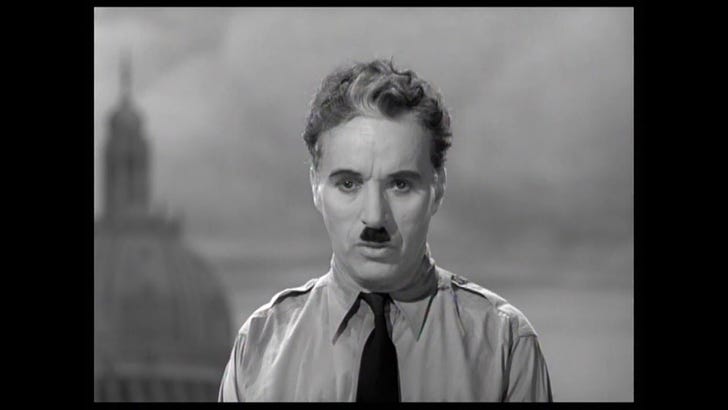The Speech That Defied Tyranny: Charlie Chaplin’s Call to Humanity
How One Comedian’s Words Became a Timeless Stand Against Fascism
"More than machinery, we need humanity. More than cleverness, we need kindness and gentleness."
In 1940, at the height of global turmoil and the rise of fascism, Charlie Chaplin released The Great Dictator, a satirical yet deadly serious film that challenged authoritarianism, racism, and war. The most unforgettable moment came at the end, when Chaplin, dropping his comedic persona, delivered a powerful and sincere speech directly to the audience. It was not just a speech within a film—it was a bold humanitarian plea that continues to resonate across generations.
Chaplin, playing a humble Jewish barber mistaken for the tyrannical dictator Adenoid Hynkel (a parody of Adolf Hitler), stands before a crowd and delivers a stirring monologue that condemns fascism and militarism while championing compassion, liberty, and shared humanity. “I’m sorry, but I don’t want to be an emperor. That’s not my business,” he begins. From there, he reminds the world that human beings are fundamentally decent, that kindness and solidarity are natural, and that greed and hatred are the real enemies.
The speech directly confronts the dehumanization of the era. In a world plagued by war machines, gas chambers, and propaganda, Chaplin dares to say what few were brave enough to express so clearly. “More than machinery, we need humanity. More than cleverness, we need kindness and gentleness.” These words countered the cold efficiency of fascist regimes with a vision rooted in moral courage and emotional intelligence.
At a time when the U.S. was still officially neutral in World War II, Chaplin’s message was considered controversial. Some critics accused him of overstepping his role as an entertainer. But Chaplin understood that silence in the face of evil is complicity. The speech was a risk—and a triumph. It captured the moral urgency of the moment, warning viewers not to be seduced by technological progress or empty nationalism. Instead, it urged them to recognize their shared dignity and the power of unity.
The speech reaches its emotional peak when Chaplin calls out to soldiers: “You are not machines. You are not cattle. You are men!” He asks them not to fight for brutes but for liberty, for decency, and for a world where science and progress are used to elevate humanity, not destroy it. His call to action is clear: resist tyranny not with more violence, but with vision, compassion, and resistance to fear.
Today, more than 80 years later, Chaplin’s words remain chillingly relevant. As authoritarian tendencies rise again around the globe, his warning feels less like a relic of the past and more like a living reminder. The machinery has become more sophisticated, the propaganda more subtle, but the dangers are the same. What Chaplin pleaded for in 1940—a world united in kindness and peace—is still an unfinished project.
The Great Dictator may be a work of fiction, but its final speech is a piece of truth. In just a few minutes, Chaplin used the power of cinema to awaken the conscience of a world drifting into darkness. His message was simple but profound: we are all human, and that alone is reason enough to stand together.
The Great Dictator By Jeffrey Vance



